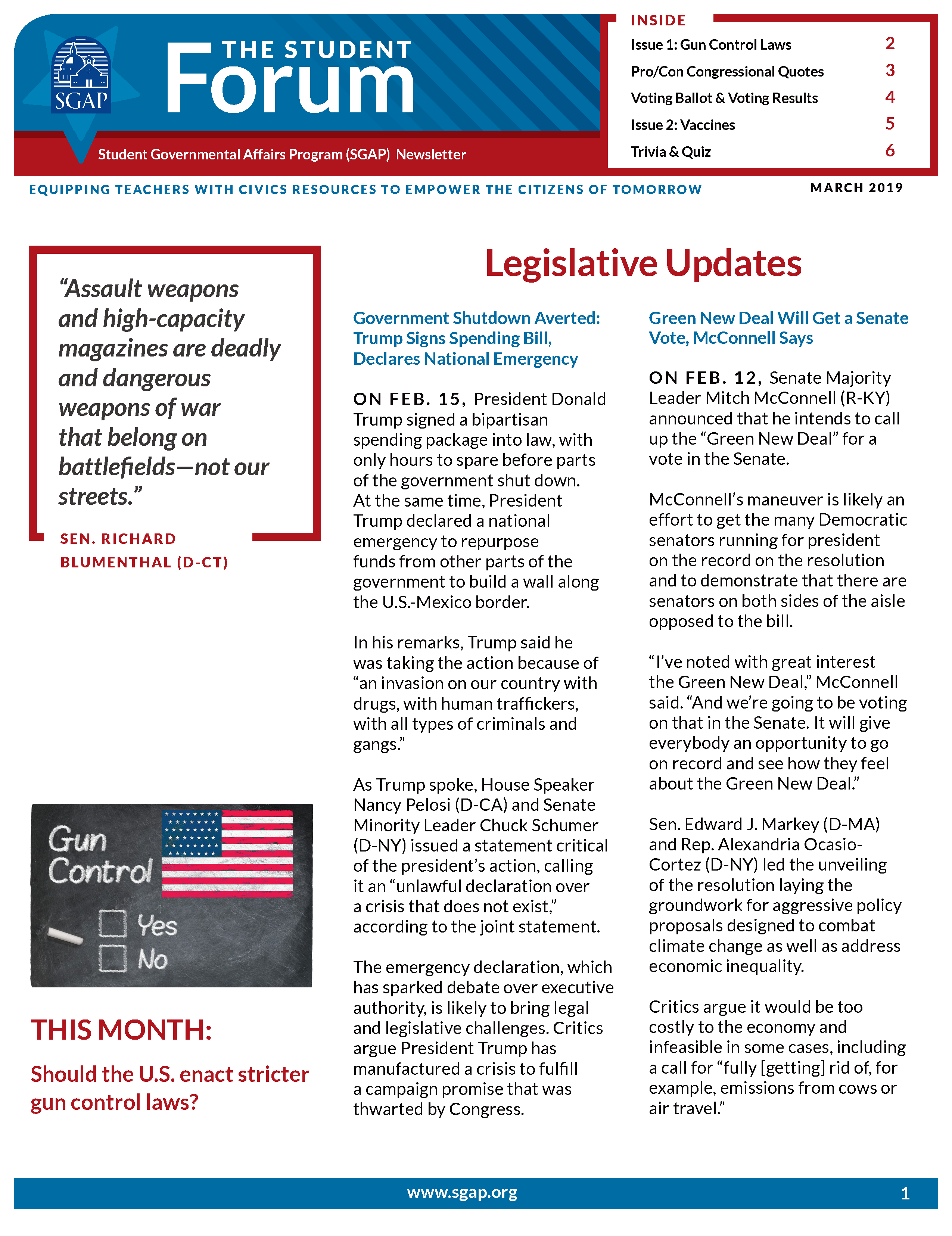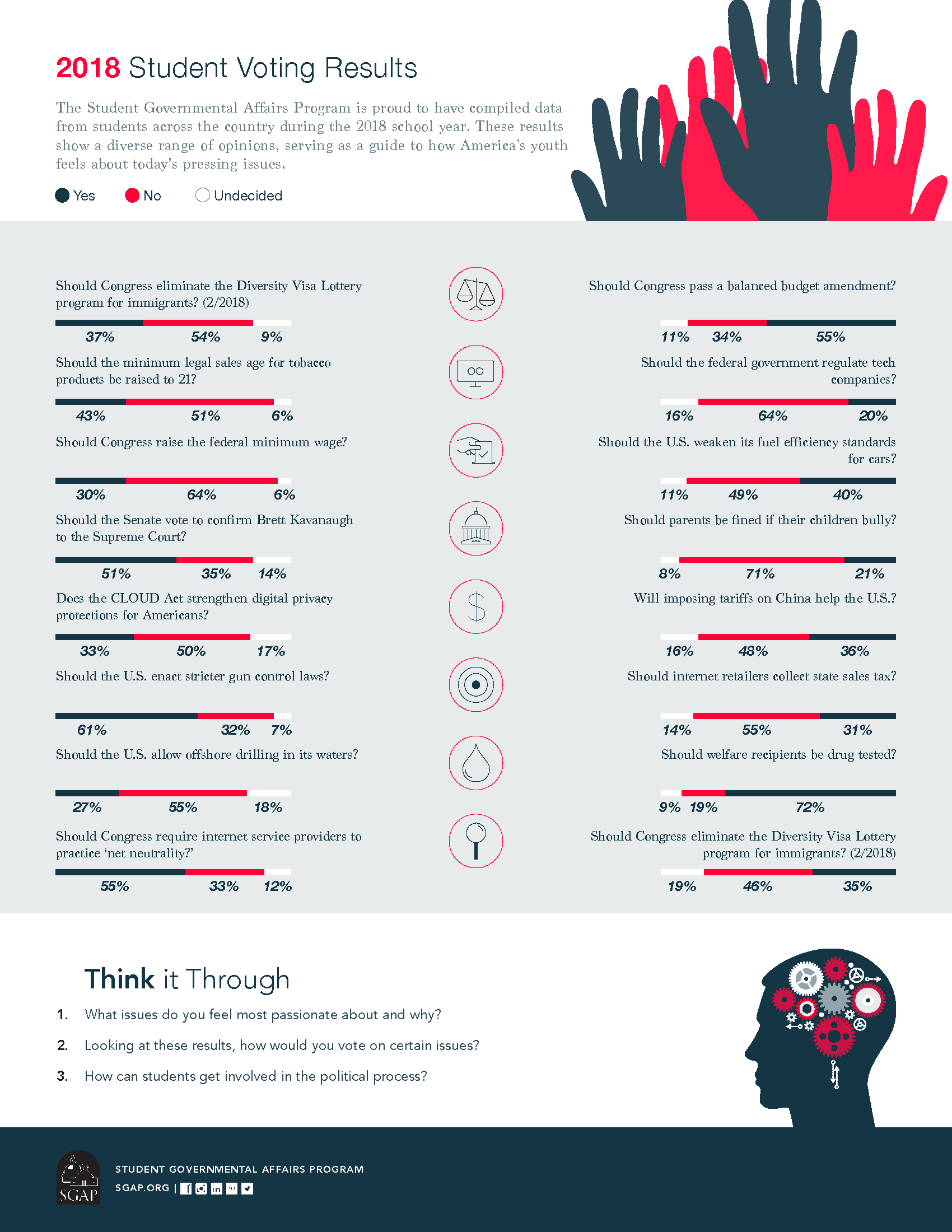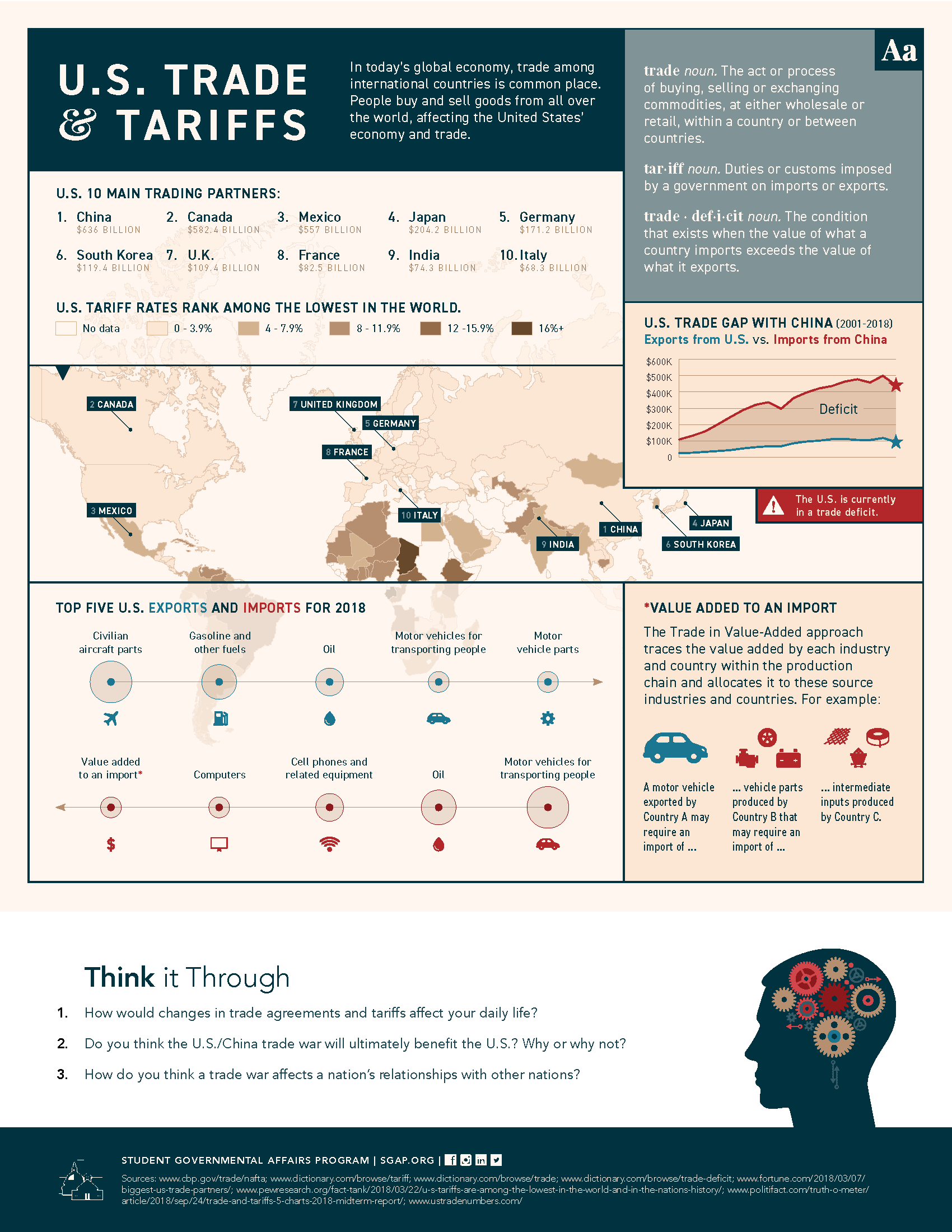Trivia Answers for April 2019 Issues
National Emergency
1. Which Republican lawmaker originally announced he was against President Trump’s national emergency declaration and then later flip-flopped and cast his vote in support of the president’s declaration?
a) Rep. Mark Meadows (R–NC)
b) Sen. Thom Tillis (R-NC)
c) Sen. Lamar Alexander (R-TN)
2. What is the name of the federal law that was passed in 1976 and formalized the emergency powers of U.S. presidents?
a) Immigration and Nationality Act
b) War Powers Resolution
c) National Emergencies Act
3. Since the above-named legislation was signed into law, how many national emergencies have been declared by U.S. presidents (as of February 2019)?
a) 59
b) 71
c) 96
4. Article I, Section 9, Clause 7, of the U.S. Constitution is referred to as what clause?
a) Separation of Powers Clause
b) Taxing and Spending Clause
c) Appropriations Clause
Civil Asset Forfeiture
1. Equitable sharing refers to a program in which the proceeds of assets seized through civil forfeiture are shared between state and federal law enforcement authorities.
a) True
b) False
2. Which law established the Assets Forfeiture Fund at the Department of Justice and the Equitable Sharing Program?
a) Drug Abuse Prevention and Control Act
b) Civil Asset Forfeiture Reform Act
c) Comprehensive Crime Control Act
3. On March 16, 2017, which lawmakers introduced the Fifth Amendment Integrity Restoration (FAIR) Act, a reform bill designed to protect innocent property owners from federal civil forfeiture? (circle all that apply)
a) Rep. Tim Walberg (R-MI)
b) Sen. Lindsey Graham (R-SC)
c) Sen. Rand Paul (R-KY)
4. Critics of civil asset forfeiture argue that the practice:
a) Disadvantages people of color and poor people
b) Violates people’s constitutional rights
c) Encourages law agencies to pad their budgets
d) All of the above
5. In civil proceedings, the government must prove the property’s connection to alleged criminal activity “beyond a reasonable doubt.”
a) True
b) False
Research Links and Critical Thinking Questions for April 2019 Issues
RESEARCH LINKS
Issue 1: National Emergency
White House: “Presidential Proclamation Declaring National Emergency”
Sen. Lamar Alexander Statement on Trump’s Emergency Declaration
Sen. Thom Tillis OpEd: “I Would Vote Against Trump’s National Emergency”
ushistory.org: “The Powers of Congress”
USA Today AGs OpEd: “Trump’s Emergency Declaration Constitutional”
Issue 2: Civil Asset Forfeiture
Supreme Court Decision on Timbs v. Indiana
Institute for Justice: “Policing for Profit – The Abuse of Civil Asset Forfeiture”
Department of Justice Statistics on Equitable Sharing Program Proceeds
Forbes: “Indiana Claims It Can Forfeit Cars For Speeding, Minor Drug Crimes”
Heritage Foundation: “7 Things You Should Know About Civil Asset Forfeiture”
National Conference of State Legislatures: “Evolving Civil Forfeiture Laws”
CRITICAL-THINKING QUESTIONS
Issue 1: National Emergency
- Review President Trump’s national emergency declaration (link above). Do you agree with his decision to declare an emergency? Why or why not?
- Why do you think the Constitution’s framers created a system of checks and balances and separation of powers for the government? Is the system working as the framers intended? Why or why not?
- What are the powers demonstrated by the legislative branch and the executive branch in this situation?
- Which branch of the government do you think has the most power? Why?
- Read the statement from Sen. Lamar Alexander on Trump’s emergency declaration (link above). Do you agree with him that Trump’s declaration sets “a dangerous precedent?” Why or why not?
Issue 2: Civil Asset Forfeiture
- Should law enforcement agencies be allowed to take money and property from people who haven’t been charged or convicted of a crime? Why or why not?
- In your opinion, does the practice of civil asset forfeiture violate citizens’ constitutional rights? Why or why not?
- Read the Supreme Court’s decision on the Timbs v. Indiana case (link above). Do you agree with the court’s conclusion? Why or why not?
- What is your position on civil asset forfeiture laws? Are they in need of reform? Why or why not?
- What protections does the Constitution provide for people who are charged with a crime? Should these same protections be guaranteed to people whose property is taken via civil asset forfeiture? Why or why not?
Student Forum Newsletter – April 2019 (National Emergency and Civil Asset Forfeiture)
Trivia Answers for March 2019 Issues
Gun Control Laws
1. According to data from the U.S. Centers for Disease Control and Prevention (CDC), nearly _________ people in the U.S. were killed by guns in 2017.
a) 30,000
b) 40,000
c) 70,000
2. Mexico has some of the strictest gun control laws in the world.
a) True
b) False
3. According to the Small Arms Survey 2018, the top three countries with the highest number of guns per civilian are:
a) United States, Serbia, Canada
b) United States, Finland, Lebanon
c) United States, Yemen and Montenegro
4. Firearms are generally classified into what three broad types?
a) Semi-automatics, pistols and rifles
b) Handguns, rifles and shotguns
c) Pistols, handguns and shotguns
5. A semi-automatic firearm fires multiple bullets with the single pull of the trigger while a fully automatic firearm fires one bullet each time the trigger is pulled.
a) True
b) False
Vaccines
1. According to the National Conference of State Legislatures, as of December 2017, ______states allowed philosophical exemptions for those who object to immunizations because of personal, moral or other beliefs.
a) 5
b) 13
c) 18
2. The U.S. Centers for Disease Control and Prevention recommends that children between birth and age six receive ______ different vaccines, including those for diphtheria, tetanus, influenza, measles and mumps.
a) 6
b) 14
c) 22
3. Children under 5 are especially susceptible to disease because their immune systems have not built up the necessary defenses to fight infection. Thus, CDC recommends immunizing by age 2.
a) True
b) False
4. What year did Dr. Jonas Salk and his team develop a vaccine for polio?
a) 1943
b) 1952
c) 1964
5. Which state passed a law (effective July 1, 2016) that closed the “vaccine exemption loophole” by eliminating personal or religious exemptions for children in that state?
a) California
b) New York
c) Vermont
Student Forum Newsletter – March 2019 (Gun Control Laws and Vaccines)
2018 Student Voting Results Infographic
U.S. Trade and Tariffs Infographic
Student Forum Newsletter – February 2019 (Troops in Syria + Food Stamps and Work)
Trivia Answers for February 2019 Issues
Troops in Syria
1. The Middle East is home to the three Abrahamic religions of Christianity, Judaism and _______________.
a) Bahá’í
b) Islam
c) Zoroastrian
2. In the first five years of the Syrian civil war, which began in 2011, approximately _______________ Syrians were killed, according to the UN Envoy for Syria.
a) 400,000
b) 650,000
c) 1.1 million
3. Bashar al-Assad has ruled Syria as president since 2000.
a) True
b) False
4. _________________ is the capital city of Syria and is sometimes called the “Jasmine City.”
a) Tripoli
b) Damascus
c) Beirut
5. The majority of Syrians belong to which religious group?
a) Druze
b) Shiite Muslim
c) Sunni Muslim
Food Stamps and Work
1. The SNAP program, commonly called food stamps, was first introduced in what year?
a) 1939
b) 1952
c) 1970
2. SNAP cost the federal government ____________ in 2017, according to the USDA.
a) $22.5 billion
b) $44 billion
c) $68 billion
3. Under current SNAP requirements, able-bodied adults without dependents (ABAWDs) must work or participate in an employment program for at least 20 hours a week to continue to receive benefits for more than ________ over a ____________ period.
a) six weeks/24-month period
b) three months/36-month period
c) four months/48-month period
4. Currently, states may request to waive the time limit in areas with an unemployment rate above 15 percent.
a) True
b) False
5. Which of these items cannot be purchased with SNAP EBT card?
a) Rotisserie chicken from deli
b) Energy drinks
c) Pet food
d) All of the above
Research Links & Critical Thinking Questions for February 2019 Topics
RESEARCH LINKS
Issue 1: Troops in Syria
NYT: “Trump Withdraws U.S. Forces from Syria”
Reuters: “Trump Starts Withdrawal of U.S. Forces from Syria”
Forbes OpEd: “U.S. Troops Don’t Belong in Syria”
The Nation: “Why We Can’t Afford to Send More Troops to the Middle East”
Resignation Letter of General Mattis, Former Secretary of Defense
The Guardian OpEd: “Donald Trump Has a Point”
Issue 2: Food Stamps & Work Requirements
USDA’s Proposed New Rule Strengthening SNAP Work Requirements
USA Today: USDA OpEd by Secretary of Agriculture Sonny Perdue
National Conference of State Legislatures SNAP Fact Sheet
Center on Budget and Policy Priorities: “SNAP Requirements Won’t Work”
USDA’s SNAP (Food Stamps) Pre-Screening Eligibility Tool
Urban Institute: “The Anti-Poverty Effects of SNAP”
CRITICAL-THINKING QUESTIONS
Issue 1: Troops in Syria
- What information would you need to make a decision about whether to keep troops on the ground in Syria?
- What are the differences between the opposing viewpoints in the pro/con congressional quotes on p. 3?
- Do you think that withdrawing troops from Syria would ultimately be better or worse for the U.S.? Explain your reasoning.
- How would you compare and contrast the advantages and disadvantages of keeping U.S. troops in Syria?
- Read Former Secretary of Defense Jim Mattis’s resignation letter to President Trump (link above). What are the major points or “big ideas” in the letter?
Issue 2: Food Stamps & Work Requirements
- Do you agree that the U.S. should set stricter work requirements for recipients of SNAP food stamps? Why or why not?
- Read the USDA OpEd by Secretary of Agriculture Sonny Perdue (link above). What ideas would you add to his reasoning and how would these ideas change his conclusions?
- How do you think a food stamps recipient would react to the proposed USDA rule for stricter work requirements for SNAP?
- What solutions could you suggest to the problem of food scarcity in the U.S.? How would they differ from the current SNAP food stamps program?
- What information would you need to make a decision about whether to establish stricter work requirements for SNAP food stamps recipients?
Trivia Answers for December 2018 Topics
Birthright Citizenship
1. Federal regulation of immigration did not begin until ________.
a) 1875
b) 1939
c) 1955
2. People who are born in the United States are automatically considered “naturalized” citizens of the country.
a) True
b) False
3. The three major rights of a citizen guaranteed under the 14th Amendment are:
a) Life, liberty and the pursuit of happiness
b) Life, liberty and property
c) Life, liberty and the right to bear arms
4. U.S. citizens are expected to fulfill certain responsibilities, including:
a) Paying taxes
b) Registering for the draft
c) Following the laws of the land
d) All of the above
5. Who is the sponsor of H.R.140 (Birthright Citizenship Act of 2017), which was introduced in the House of Representatives on Jan. 3, 2017?
a) Rep. Ted Cruz (R-TX)
b) Rep. Steve King (R-IA)
c) Rep. Dick Durban (D-IL)
Balanced Budget Amendment
1. Of the three main categories of the United States federal budget, which category does Medicare fall under?
a) Mandatory spending
b) Discretionary spending
c) Interest on debt
2. Military and defense spending fall under mandatory spending.
a) True
b) False
3. In what year did the last government shutdown occur as a result of disagreement over government spending?
a) 2008
b) 2011
c) 2013
4. Since________, Congress has never passed more than a third of its regular appropriations bills on time.
a) 1997
b) 2001
c) 2008
5. According to the Congressional Budget Office (CBO), annual mandatory spending will increase to about ___% of GDP by 2027.
a) 2.5%
b) 14%
c) 27%
6. In fiscal year 2017, of all federal outlays, mandatory spending accounted for ___% of all federal outlays while discretionary spending totaled about ___%.
a) 48%, 45%
b) 52%, 41%
c) 63%, 30%







